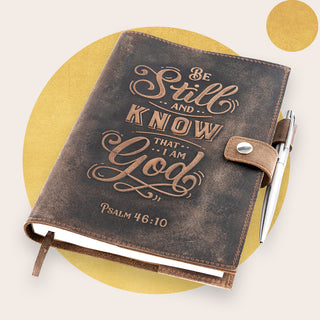Want to know how to start a prayer journal? Want to know what to include in your prayer journal? Want to know what not to include?
Then step right up as we explore some top tips on how to start your very own prayer journal!
Ask Yourself: Why Are You Journaling?
A good place to begin to learn how to keep a journal is indeed to ask yourself this crucial question. After all, how do you expect to get anywhere in your prayer journaling without knowing your specific reason for wanting to start in the first place?
Sure, you may love your god, but that is not really enough sometimes, especially if you are looking to profess it on a page like so.
It can be all too easy to start journals and then stop them after only a few days of work. As types of journaling go, prayer journals are no exception - many have been known to take up pen and paper and neglect their dedication to the cause after only a short time.
If, however, you know for certain exactly why you are starting a prayer journal in the first place then you are far more likely to keep at it. You might, for example, simply want to chronicle your prayer life more accurately, or perhaps you are looking to codify any prayer requests your flock might have.
Whatever the specific reason, knowing it for sure means that you are far more likely to stick with it and spread your god's word without reluctance.
Some other specific reasons can include:
- having a more detailed record of your faithfulness to god than your memory might allow - this will make your confessions much more fruitful.
- tracking, as aforementioned, the prayer requests of your flock.
- releasing your burdens and troubles to the lord - using prayer journal ideas as prayers in themselves.
- celebrating your god's blessing and their shortcomings also - every faith journal should have a two-sided approach.
- this can be your very own religious therapist, a dedicated prayer notebook just for your own personal growth and development.
Ask Yourself: What Kind of Journal Works Best For You?
Once upon a time, if someone referred to a journal, there would have been no doubt in anyone's mind as to what they were referring to - a paper notebook, pure and simple. This is the image that the word would conjure up in your mind.
Nowadays, with the ever-advancing tide of technology and the like, a journal can mean just about anything that codifies things for you in a certain way.
Listed here are some of the more common and more popular types of journals today:
- Plenty of journals made today are still premade for you in stationery stores and bookstores. You can even purchase some that have prayer journal sections already delineated within.
- Alternatively, many choose instead to make a DIY prayer journal. Making your own DIY prayer journal is a sure way to attain an even stronger connection with your prayer journal and, thus, with your god. If you involve yourself enough with the journal as to design it all yourself, then what could possibly stop you from feeling His breath against your cheek?
- More and more popular these days is the idea of using a digital prayer journal. This does not bear as much of a resemblance to paper journals as making a homemade prayer journal but is more or less attempting to achieve the same thing. Using one will still enable you to chronicle your god answered prayers, make time for prayer time, and praise god.
No matter what kind of journal you use, you will want to ensure that it is one that is going to engage and that you are going to be able to return to repeatedly. If, for example, you are someone who generally struggles with technology then you are going to want to avoid using a digital journal.

Sections
Besides attempting to find a regular time of day with which to chronicle god's goodness n a simple prayer journal, arguably the most important aspect of journaling is how you lay it out.
Here are some ideas for sections that you can use to delineate the things of importance in your prayer journaling:
- Daily Prayers - having a place where you record the prayers that you are either going to perform in one day or that you have performed is one of the main reasons anyone starts a prayer journal. Keeping track in this way is a great way to make sure that you are using as many different prayers as possible.
- Prayer Requests - keep track of all the requests that you have made in your prayers overall and ensure that you know when your god has or has not answered them. This is a great way to test your faith!
- Praises - celebrating your god's strength and provision has never been easier than with a prayer journal to do it in. Chronicling the times he has answered your prayers is an apt way to strengthen your faith in the face of all the doubts that might pile up when he does not answer certain aspects of your prayers.
- Worship - again, making a list of reasons why you worship your god in the first place will strengthen your faith, however much it might wain from time to time.
- Scriptures - make a list of your favorite scriptures. Maybe even hand write them out into the journal so that you can better remember them. Using scriptures in this way will shield you from doubt and deceit when hard times fall upon you and test your faith in your god.

Last Words
So, there you have it! Hopefully, you have found some peace and divine inspiration here today and feel better equipped to start your very own prayer journal. Make it your own but never forget the real reason you began this process in the first place.
FAQs How To Start a Prayer Journal
What does a prayer journal consist of?
The best part about journaling is that you can include just about anything you can conceive of in it. In a prayer journal, though - or any other journal aimed at a particular thing - there is likely going to be a set of specific aims and goals. In this instance, you might include any requests you make in your prayers, your reasons for believing in god in the first place, anything you might like to remember for confession, as well as anything else you can think of along the way.
How do you start a prayer introduction?
There is no better way to start a prayer than to address your god. After all, are they not the figure to whom the prayer is directed? No doubt this will be a prayer directed to a Christian god, so you can do well by referring to Him as 'father in heaven' or 'heavenly father'. After this, you can take it just about anywhere you wish. The whole idea of praying is not necessarily to just make a whole bunch of demands to your god, but rather to direct his attention to places that you think need it most.



